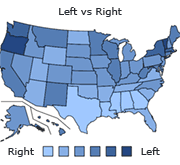Which Canadian Political Party Should you Vote for?
There are a few people who actually know what each party stands for? But there is a faster way to find out which party you actually believe in? Canada's governmental structure was originally established by the British parliament through the British North America Act (now known as the Constitution Act, 1867), but the federal model and division of powers were devised by Canadian politicians. Particularly after World War I, citizens of the self-governing Dominions, such as Canada, began to develop a strong sense of identity, and, in the Balfour Declaration of 1926, the British government expressed its intent to grant full autonomy to these regions. Thus in 1931, the British Parliament passed the Statute of Westminster, giving legal recognition to the autonomy of Canada and other Dominions. Following this, Canadian politicians were unable to obtain consensus on a process for amending the constitution until 1982, meaning amendments to Canada's constitution continued to require the approval of the British parliament until that date. Similarly, the Judicial Committee of the Privy Council in Britain continued to make the final decision on legal issues until 1949. As well, because of the Canadian Charter of Rights and Freedoms and rulings of courts on legislation, Canada is becoming more like a constitutional democracy, as opposed to the parliamentary democracy of its design.
Are you a blue Tory who supports Stephen Harper? Or a Separatists who votes for the Bloc? Take this Quiz and find out which party you actually support.The politics of Canada function within a framework of constitutional monarchy and a federal system of parliamentary government with strong democratic traditions. Many of the country's legislative practices derive from the unwritten conventions of and precedents set by the United Kingdom's Westminster parliament; however, Canada has evolved variations. For example, party discipline in Canada is stronger than in the United Kingdom, and more parliamentary votes are considered motions of confidence, which tends to diminish the role of non-Cabinet Members of Parliament (MPs). Such members, in the government caucus, and junior or lower-profile members of opposition caucuses, are known as backbenchers. Backbenchers can, however, exert their influence by sitting in parliamentary committees, like the Public Accounts Committee or the National Defence Committee.
Are you ready for...
Our "When Will I Die" Quiz?

